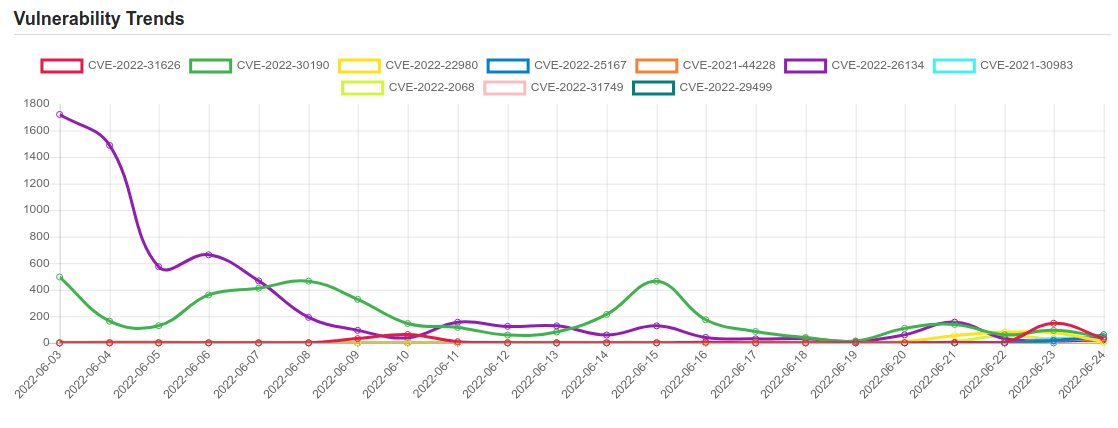Daily Vulnerability Trends: Sat Jun 25 2022

| CVE NAME | CVE Description |
| CVE-2022-2156 | No description provided |
| CVE-2022-30151 | Windows Ancillary Function Driver for WinSock Elevation of Privilege Vulnerability. |
| CVE-2022-0185 | A heap-based buffer overflow flaw was found in the way the legacy_parse_param function in the Filesystem Context functionality of the Linux kernel verified the supplied parameters length. An unprivileged (in case of unprivileged user namespaces enabled, otherwise needs namespaced CAP_SYS_ADMIN privilege) local user able to open a filesystem that does not support the Filesystem Context API (and thus fallbacks to legacy handling) could use this flaw to escalate their privileges on the system. |
| CVE-2022-29581 | Improper Update of Reference Count vulnerability in net/sched of Linux Kernel allows local attacker to cause privilege escalation to root. This issue affects: Linux Kernel versions prior to 5.18; version 4.14 and later versions. |
| CVE-2022-32405 | Prison Management System v1.0 was discovered to contain a SQL injection vulnerability via the ‘id’ parameter at /pms/admin/prisons/view_prison.php:4 |
| CVE-2022-29582 | In the Linux kernel before 5.17.3, fs/io_uring.c has a use-after-free due to a race condition in io_uring timeouts. This can be triggered by a local user who has no access to any user namespace; however, the race condition perhaps can only be exploited infrequently. |
| CVE-2022-1116 | Integer Overflow or Wraparound vulnerability in io_uring of Linux Kernel allows local attacker to cause memory corruption and escalate privileges to root. This issue affects: Linux Kernel versions prior to 5.4.189; version 5.4.24 and later versions. |
| CVE-2022-31626 | In PHP versions 7.4.x below 7.4.30, 8.0.x below 8.0.20, and 8.1.x below 8.1.7, when pdo_mysql extension with mysqlnd driver, if the third party is allowed to supply host to connect to and the password for the connection, password of excessive length can trigger a buffer overflow in PHP, which can lead to a remote code execution vulnerability. |
| CVE-2022-30190 | Microsoft Windows Support Diagnostic Tool (MSDT) Remote Code Execution Vulnerability. |
| CVE-2022-25167 | Apache Flume versions 1.4.0 through 1.9.0 are vulnerable to a remote code execution (RCE) attack when a configuration uses a JMS Source with a JNDI LDAP data source URI when an attacker has control of the target LDAP server. This issue is fixed by limiting JNDI to allow only the use of the java protocol or no protocol. |
| CVE-2021-44228 | Apache Log4j2 2.0-beta9 through 2.15.0 (excluding security releases 2.12.2, 2.12.3, and 2.3.1) JNDI features used in configuration, log messages, and parameters do not protect against attacker controlled LDAP and other JNDI related endpoints. An attacker who can control log messages or log message parameters can execute arbitrary code loaded from LDAP servers when message lookup substitution is enabled. From log4j 2.15.0, this behavior has been disabled by default. From version 2.16.0 (along with 2.12.2, 2.12.3, and 2.3.1), this functionality has been completely removed. Note that this vulnerability is specific to log4j-core and does not affect log4net, log4cxx, or other Apache Logging Services projects. |
| CVE-2022-26134 | In affected versions of Confluence Server and Data Center, an OGNL injection vulnerability exists that would allow an unauthenticated attacker to execute arbitrary code on a Confluence Server or Data Center instance. The affected versions are from 1.3.0 before 7.4.17, from 7.13.0 before 7.13.7, from 7.14.0 before 7.14.3, from 7.15.0 before 7.15.2, from 7.16.0 before 7.16.4, from 7.17.0 before 7.17.4, and from 7.18.0 before 7.18.1. |
| CVE-2021-30983 | A buffer overflow issue was addressed with improved memory handling. This issue is fixed in iOS 15.2 and iPadOS 15.2. An application may be able to execute arbitrary code with kernel privileges. |
| CVE-2022-2068 | In addition to the c_rehash shell command injection identified in CVE-2022-1292, further circumstances where the c_rehash script does not properly sanitise shell metacharacters to prevent command injection were found by code review. When the CVE-2022-1292 was fixed it was not discovered that there are other places in the script where the file names of certificates being hashed were possibly passed to a command executed through the shell. This script is distributed by some operating systems in a manner where it is automatically executed. On such operating systems, an attacker could execute arbitrary commands with the privileges of the script. Use of the c_rehash script is considered obsolete and should be replaced by the OpenSSL rehash command line tool. Fixed in OpenSSL 3.0.4 (Affected 3.0.0,3.0.1,3.0.2,3.0.3). Fixed in OpenSSL 1.1.1p (Affected 1.1.1-1.1.1o). Fixed in OpenSSL 1.0.2zf (Affected 1.0.2-1.0.2ze). |
| CVE-2022-31749 | No description provided |
| CVE-2022-29499 | The Service Appliance component in Mitel MiVoice Connect through 19.2 SP3 allows remote code execution because of incorrect data validation. The Service Appliances are SA 100, SA 400, and Virtual SA. |
| CVE-2022-34305 | In Apache Tomcat 10.1.0-M1 to 10.1.0-M16, 10.0.0-M1 to 10.0.22, 9.0.30 to 9.0.64 and 8.5.50 to 8.5.81 the Form authentication example in the examples web application displayed user provided data without filtering, exposing a XSS vulnerability. |
| CVE-2022-26809 | Remote Procedure Call Runtime Remote Code Execution Vulnerability. This CVE ID is unique from CVE-2022-24492, CVE-2022-24528. |
| CVE-2022-30157 | Microsoft SharePoint Server Remote Code Execution Vulnerability. This CVE ID is unique from CVE-2022-30158. |
| CVE-2022-22980 | VMware Tanzu Spring Data MongoDB code execution | CVE-2022-22980 |
If you like the site, please consider joining the telegram channel and supporting us on Patreon using the button below.



